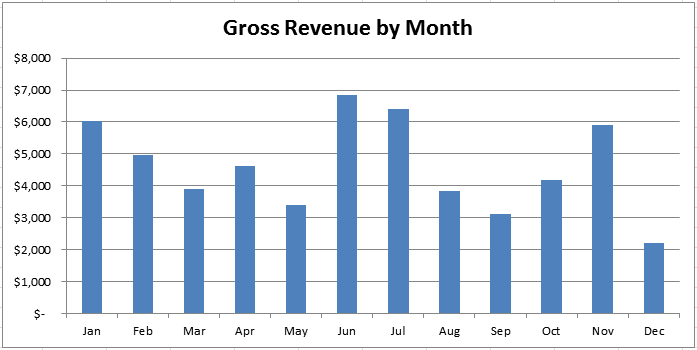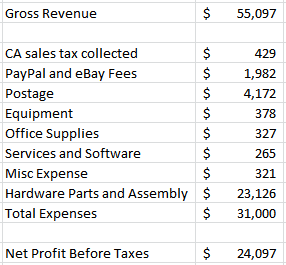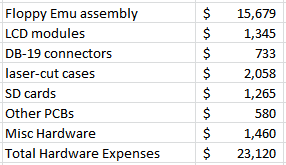Kit Biz Profit and Loss

Have you ever wondered what life is like in the “kit biz”, with a part-time business selling electronic gizmos to hobbyists? Maybe you’ve thought about selling one of your own creations, or were just curious if it’s possible to make any money this way. In the spirit of helping the hobbyist community, I’m sharing the 2015 BMOW profit and loss breakdown here. My hope is that others might provide some helpful insights, or learn something that can help their own efforts. Normally I would keep this type of information private, but I decided there’s no harm in sharing, and more knowledge can only help.
BMOW began as a place to document my personal electronics projects and musings, and remains primarily an electronics blog. But along the way, it accidentally grew into a small business too, as some of the projects generated interest from readers wanting to buy hardware for themselves. Chief among these is the Floppy Emu disk emulator for vintage Apple computers, and its related accessories. The Mac ROM-inator replacement ROM for early Macintoshes also has a small but devoted following. Today BMOW is a part-time 1-man business, to which I devote an average of about 10-20 hours per week for R&D, hardware assembly, customer support, and order fulfillment.
Total BMOW gross revenue in 2015 was $55,097. As you can see in the graph, month-to-month revenue varied more than 2x. There was an obvious bump in June and July, when the addition of Apple II emulation features boosted Floppy Emu sales. Sales also jumped in November for no discernible reason, and inexplicably slumped in December during what should have been the year’s strongest period (but recovered in January 2016).
The gross revenue figure includes all the money I collected: that’s money from product sales, California sales taxes collected, and shipping fees. I don’t really consider the latter two as income, because they go to the state or the post office, and not into my pocket, and their inclusion here makes the “revenue” figure look more impressive than it is. Accounting experts might argue whether sales tax and shipping fees should be included as revenue, or dealt with some other way. I’ve chosen to list them as revenue, with an offsetting expense listed later.
Expenses
Of course that money isn’t all profit. Let’s look at the expenses for the year:

I rang up $31,000 in total expenses for 2015, resulting in a net profit of $24,097. Assuming I worked an average of 15 hours per week, that’s $31/hour before paying income taxes. That’s a lot better than the federal minimum wage, which is one test not every kit biz passes. But it’s a lot less than my typical hourly rate for consulting work, or the rate I could likely earn at a full-time electronics engineering job. One of my big goals for 2016 is to reduce the amount of time spent on things like support and order fulfillment, by searching for efficiency improvements. Much of what I do now is very labor-intensive, and there’s lots of opportunity to make more effective use of time.
I collected $429 on behalf of the state of California, which is an extra hassle that involves a special tax return filed each January. PayPal and eBay took $1982, or about a 3.6% cut of gross revenue. Given how frustrating and awkward PayPal is to work with, I don’t enjoy giving them anything, but it’s about the same rate that I’d pay if I accepted credit card payments directly. I made only a couple of eBay sales in 2015, which is fortunate because they charge 10% commission on top of PayPal’s 3% fee. Ouch.
The post office must really love me: $4172 in postage fees! Sometimes I wonder how eBay sellers in Asia can ship to the USA for a dollar or two, when I can’t even send a package within the USA for less than $6. International postage for small packages to most countries except Canada starts at $13, and (as of rate increases a few weeks ago) is over $20 for the weight of a typical BMOW order. My customers pay the shipping costs, so it doesn’t directly affect me, but I wish I could offer lower shipping rates.
The $378 for equipment represents hardware development tools and machines used for testing. Office supplies like shipping boxes, paper, address labels, ink, and bubble wrap were a $327 expense. The cost for web hosting fees and a few commercial software programs totaled $265, and my city business license was $321.
Hardware is Expensive
The biggest BMOW expense by far was the $23,126 cost of hardware and assembly. Unlike a software publishing business, selling hardware gizmos requires spending a lot of money upfront on hardware parts first. These parts must be purchased in large quantities to get the best prices, so it’s necessary to go into debt temporarily, and make up the debt later from product sales income. In my case I didn’t literally go into debt, but for a while my year-to-date expenses exceeded revenue by several thousand dollars. I have a lingering fear that demand will suddenly evaporate just after I make a big hardware purchase, or something will happen to make my products instantly obsolete, and I’ll be left with thousands of dollars in useless inventory.
$23,126 for hardware and assembly is a big number, so let’s break it down:

Floppy Emu boards are built by Microsystems Development Technologies in San Jose, CA. The cost for parts and assembly of the “core” Emu modules came to a whopping $15,679. This doesn’t include the LCD displays and the ever-elusive DB-19 connectors, which were purchased separately for $1345 and $733, respectively. The clear acrylic case for Floppy Emu is a popular option, and I spent $2058 on materials and laser cutting services for those. A further expense of $1265 was for the SD cards used in the Vintage Software Collection. I buy a lot of SD cards.
$580 went towards making PCBs for hand-built Floppy Emu accessories: the Universal Adapter and the A/B Drive Switch. This amount also included other non-Emu projects like the ROM-inator, Sonic Bow Tie, 68 Katy, and various prototypes and experimental hardware. The chips and other components needed to populate all those PCBs ran to $1460.
Room for Improvement?
This was a good result for 2015, so I’m not complaining. Still, there’s always room for improvement. While I’d love to boost sales volume or drive down costs, the area that’s most ripe for improvement isn’t money but time. There’s a tremendous amount of manual labor involved in most of what I do, and some weeks it cuts into my spare time so much that I deeply resent it. And even during weeks when the labor effort is more manageable, I’d rather spend an extra hour developing a new feature, or researching a new project, than bubble wrapping and boxing. Going forward, I’m going to look for opportunities where I can pay someone else to offload some of the manual work. Even if my costs go up as a result, and my net profit goes down, I’ll still consider it a success if the profit per hour of time spent improves. After all, it’s not my goal to spend every last waking hour of my life devoted to weird electronic gizmos – there are other things.

Here are some of the time-saving ideas I’m looking at for 2016.
Testing – During assembly, Microsystems Development Technologies verifies that each Floppy Emu passes its built-in self-test. Once I get the hardware, I do further testing myself: adjusting each unit’s LCD contrast, assigning a serial number, and actually running an emulated disk on a Mac or Apple II system. That all takes time. Initially it seemed unthinkable to send Microsystems an old Mac Plus and instructions for booting up System 3.2, but now I’m considering doing exactly that. They’re smart guys, they can figure it out.
Low-Volume Assembly – The items with lower sales volumes, like the Universal Adapter and A/B switch, are hand-built one at a time by me. They don’t take more than 10 or 15 minutes at most, but sometimes I just want to ship an order without hauling out the soldering iron first. Even when I build a few at a time to keep a small stock on hand, it turns into a few hours of work here and there that I’d rather spend on something else. Microsystems might not be the right people to build these for me, but there are plenty of other low-volume assembly services like Smart Prototyping. I need to find the time to research them and make an order.
Fulfillment – The most manual of the manual labor I face is order fulfillment. That means printing invoices, picking hardware out of boxes, sorting things into little piles, bubble wrapping, boxing, and taping. I once had a summer job as a shipping clerk, and this is pretty much exactly the same thing. And it still sucks. I could improve on this a little if I had a dedicated shipping area, with big rolls of tape and bubble wrap and boxes neatly stacked and ready to go. At times I’ve paid my daughter to do this work, but she doesn’t like it much either. Maybe a part-time helper from a temp agency? The need for this help is irregular, so I’m not sure how well a temp employee would work anyway.
PayPal and Postage – In an ideal world, I would log into a web site, and click a button to fetch all my new orders. This would automatically update my sales history, print a bunch of invoice slips, calculate the weight of each outgoing package, purchase the necessary postage, and print it. But in reality this process requires a crazy combination of the PayPal site, US Post Office site, and custom software. It’s an orgy of clicking, cutting and pasting, and manual steps. PayPal requires purchasing and printing postage for each order, One. At. A. Time. The post office web site lacks a way to import shipment details, so information must be manually pasted into forms and drop-down boxes stretched across several pages of the site. And don’t get me started again about their abysmal handling of international package addressing, which I’ve discussed here before (1, 2).
For postage there are alternatives like Endicia and Stamps.com, which should allow importing shipment details and combining purchases of all postage for a set of orders. Both services have fairly poor reviews, so I’ve resisted making the switch, but they can hardly be worse than the system I’m using now. On the payments end, unfortunately I don’t see any simple alternative to PayPal. It’s often clumsy and frustrating, but it provides a basic shopping cart system and handles a wide variety of payment types from nearly every country. Square seems more geared towards physical storefronts and swiping a credit card. Amazon Payments may be the most similar to PayPal, though I don’t know much about it.
Did you ever sell a product online? What was it?
What’s your favorite maker-friendly electronic gizmo?
Have a good post office story to share? I once received a coconut mailed from Hawaii. Just the coconut, with my address written on the shell.
Read 14 comments and join the conversation14 Comments so far
Leave a reply. For customer support issues, please use the Customer Support link instead of writing comments.


“Sometimes I wonder how eBay sellers in Asia can ship to the USA for a dollar or two, when I can’t even send a package within the USA for less than $6”
I wondered that as well. I found this article last year very enlightening: https://www.washingtonpost.com/news/storyline/wp/2014/09/12/the-postal-service-is-losing-millions-a-year-to-help-you-buy-cheap-stuff-from-china/
tl;dr Asian businesses send stuff over in bulk and the USPS has to sort it all out.
Thanks for sharing some insight into the business Steve. One idea to reduce assembly time/costs is to offer a kit form. Many of your customers are electronics savvy and enjoy assembling or partially assembling a kit. I know you already do that for the ROMinator, but the universal adapter is a good candidate as well.
The only potential downside is losing any time savings with frustrating user support.
What about using a service like Shopify instead of Paypal, I’m not sure of the rates but I hear that the platform is great to use (disclosure: I have friends that work there but I’ve never used it myself). We feel your pain in Canada on shipping rates, it’s way to expensive to move goods around the country
All good suggestions, thanks. After doing some more time analysis, I’ve decided to make a few changes:
1. Floppy Emu boards will no longer have serial numbers. The S/N isn’t really necessary, and it’ll save me about a minute per order to pull the board from its bag, write a S/N on it, log it in a spreadsheet, and return it to the bag.
2. Integrate a proper shopping cart system like Zen Cart. PayPal’s basic shopping cart feature is OK, but can be awkward to use. It also ties the shopping cart solution to the payment solution. For now I can integrate Zen Cart with PayPal and continue accepting payments that way, but later I can switch to another payment processor without needing to modify the shopping cart.
3. (Probably) Sign up for one of the shipping services like Endicia or ShipStation. ShipStation looks nice and I get a good feeling from browsing their online help, but it’s a bit more expensive than the others. ShipStation looks like more of a general e-commerce solution, while Endicia and Stamps.com look more like postage-printing solutions.
Hi. Your products are very neat and useful. Congratulations on that!
Frankly, you are doing all of the things, instead of focusing your efforts on the things where you add the most value, and probably get the most psychological reward.
Best of luck in 2016. E-mail me if you want to discuss wholesaling.
P.S. I’ve been following your blog for some time, and was surprised when you mentioned Yev in a post. I knew him when I worked for OPNET. Did you work there at some point too?
What a small world! I never worked at OPNET. Yev is a good friend from my college days, and we also lived together while he was in grad school. He has defeated me at countless games of Monopoly.
Thanks for all that you have done! you are a good person! i love your stuff, and your website.
I’m going per my taxes now as well and i am screwed this year HAHA…
Why do we do what we do…. Good question… I would like to chalk it up as
feeling good at the end of the day. After all its just a lease on life… i would
rather go out knowing i caused as many smiles as i can. Other then working some
9 2 5 punching a clock and hating my self at the end of the day.
Steve,
Thanks for making an awesome product! I’ve just received and encased my second Floppy Emu and what a great feeling it is for this old Apple-head to revive the glory days again like when I was a kid. I’m glad there are still a few other people than me who are passionate about older Apple gear. Thanks for making me a happy customer. I also enjoy reading your blog and what you’re tweaking around with.
On another note.. What’s your solution going to be for the great DB19 conundrum?
I was just working on the DB19 conundrum today, actually. I’m making one more effort to locate more stock, but I’m not optimistic. Having new ones made is probably beyond my reach in terms of expense and my ability to forge trans-Pacific business partnerships. So I’m working on an improved version of the DB19 substitute that I described a year ago, and will probably go forward with that solution.
Hi Steve.
Have you already tried these guys in Germany?
http://www.elw-shop.de/ProductStaffelDetails.aspx?productID=00139014
Thanks, I sent them an email. Lots of places advertise having them even when they don’t, but maybe this will be the lucky one…
Yes, they have them! No, they do not speak English! Trying to negotiate a purchase using Google Translate is a challenge. I think I need a German speaker to help with the details. Thanks for the pointer!
Hi Steve, I am a friend of Brian’s and I speak some German and live in the Stuttgart area. If you email me the details to scudder.john@gmail.com I will find a way to translate them or send a message to the vendor on your behalf.
Thanks for helping advance the hobbyist community. Very impressed at the attention to detail throughout your site and products. Posts like this help remove the mystery around getting an idea into the hands of fellow hobbyists.